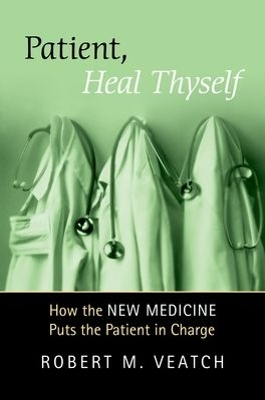
Patient, Heal Thyself
How the "New Medicine" Puts the Patient in Charge
Seiten
2008
Oxford University Press Inc (Verlag)
978-0-19-531372-7 (ISBN)
Oxford University Press Inc (Verlag)
978-0-19-531372-7 (ISBN)
Patient, Heal Thyself is on a theme developed by the author for 30 years, that a radical change is sweeping through the American healthcare system that puts the patient in charge of treatment to an unprecedented extent.
Robert Veatch is one of the founding fathers of contemporary bioethics. In Patient, Heal Thyself, he sheds light on a fundamental change sweeping through the American health care system, a change that puts the patient in charge of treatment to an unprecedented extent. The change is in how we think about medical decision-making. Whereas medicine's core idea was that medical decisions should be based on the hard facts of science--the province of the doctor--the "new medicine" contends that medical decisions impose value judgments. Since physicians are not trained to make value judgments, the pendulum has swung greatly toward the patient in making decisions about their treatment. Veatch shows how this is presently true only for value-loaded interventions (abortion, euthanasia, genetics) but is coming to be true for almost every routine procedure in medicine--everything from setting broken arms to choosing drugs for cholesterol. Veatch uses a range of fascinating examples to reveal how values underlie almost all medical procedures and to argue that this change is inevitable and a positive trend for patients.
Robert Veatch is one of the founding fathers of contemporary bioethics. In Patient, Heal Thyself, he sheds light on a fundamental change sweeping through the American health care system, a change that puts the patient in charge of treatment to an unprecedented extent. The change is in how we think about medical decision-making. Whereas medicine's core idea was that medical decisions should be based on the hard facts of science--the province of the doctor--the "new medicine" contends that medical decisions impose value judgments. Since physicians are not trained to make value judgments, the pendulum has swung greatly toward the patient in making decisions about their treatment. Veatch shows how this is presently true only for value-loaded interventions (abortion, euthanasia, genetics) but is coming to be true for almost every routine procedure in medicine--everything from setting broken arms to choosing drugs for cholesterol. Veatch uses a range of fascinating examples to reveal how values underlie almost all medical procedures and to argue that this change is inevitable and a positive trend for patients.
Robert Veatch is Professor of Medical Ethics at the Kennedy Institute of Ethics, Georgetown University. He received the career distinguished achievement award from Georgetown University in 2005 and has received honorary doctorates from Creighton and Union College. He is listed in Who's Who in America.
PART I: WHY DOCTOR DOES NOT KNOW BEST ; PART II: NEW CONCEPTS FOR THE NEW MEDICINE ; PART III: THE NEW MEDICINE AND THE NEW MEDICAL SCIENCE
| Erscheint lt. Verlag | 13.11.2008 |
|---|---|
| Verlagsort | New York |
| Sprache | englisch |
| Maße | 157 x 236 mm |
| Gewicht | 567 g |
| Themenwelt | Sachbuch/Ratgeber ► Gesundheit / Leben / Psychologie |
| Medizin / Pharmazie ► Medizinische Fachgebiete ► Medizinethik | |
| Studium ► Querschnittsbereiche ► Geschichte / Ethik der Medizin | |
| ISBN-10 | 0-19-531372-0 / 0195313720 |
| ISBN-13 | 978-0-19-531372-7 / 9780195313727 |
| Zustand | Neuware |
| Haben Sie eine Frage zum Produkt? |
Mehr entdecken
aus dem Bereich
aus dem Bereich
Die Geschichte eines Weltzentrums der Medizin von 1710 bis zur …
Buch | Softcover (2021)
Lehmanns Media (Verlag)
CHF 27,90
von der Antike bis zur Gegenwart
Buch | Softcover (2024)
C.H.Beck (Verlag)
CHF 16,80
Krankheitslehren, Irrwege, Behandlungsformen
Buch | Softcover (2024)
C.H.Beck (Verlag)
CHF 55,90


